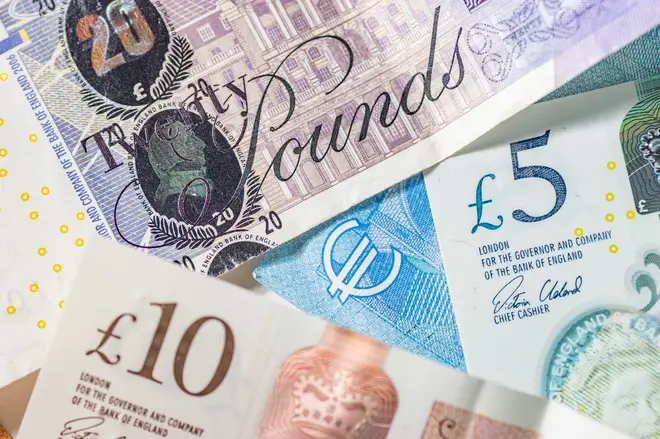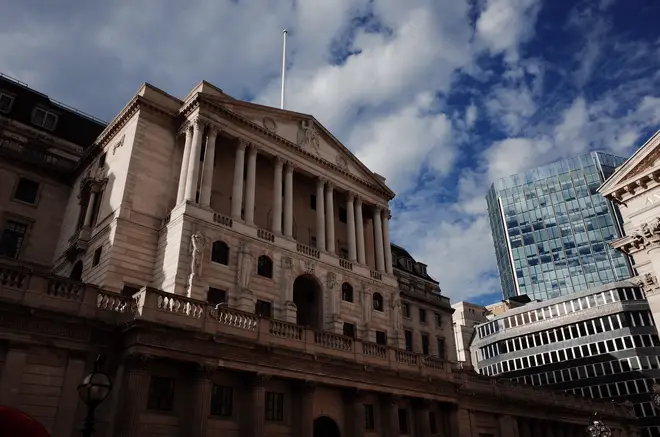
Shelagh Fogarty 1pm - 4pm
16 September 2020, 15:37 | Updated: 16 September 2020, 16:18

Inflation has an impact on everything we purchase from our weekly shopping to houses and cars.
UK inflation fell to 0.2% in August from 1% in July - the lowest level for almost half a decade - as a result of the Eat Out to Help Out scheme, according to official figures.
The Office for National Statistics (ONS) said on Wednesday the Consumer Price Index (CPI) had taken a tumble to its lowest rate since December 2015 thanks to several changes during the coronavirus pandemic, but particularly Chancellor Rishi Sunak's dining initiative.
Eat Out to Help Out - which ran through August and saw more than 100 million meals eaten - allowed cafés and restaurants to apply discounts on their meals as part of a government scheme to encourage people to dine out again.
So what is inflation and how does it impact you?
Read more: Eat Out to Help Out pushes UK inflation down to five-year low
Read more: Economy grew by 6.6 per cent in July as lockdown measures eased

Inflation represents the rate at which goods and services increase in price over a period of time. Therefore, if the general prices of items in an economy go up, that amounts to inflation.
It is crucial for measuring a country's economic wellbeing as it affects how much people can buy with the money they earn. If goods and services generally cost more, one cannot purchase as much.
The national rate of inflation is expressed as a percentage, as is inflation on every day items. For example, if the rate of inflation for UK houses is at 3% a year, then buyers must spend 3% more on a new home than they would have done 12 months earlier.
If people's wages and salaries increase at the same rate of inflation, then they should still be able to purchase the same goods and services year-on-year. But, if wage increases fall below the rate of inflation, that person's purchasing power and standard of living will fall.
Some inflation is healthy as it encourages the consumer to make purchases sooner rather than later, which helps businesses increase wages which, in turn, can boost the economy - this is why most central banks have a target of 2-2.5%.

Professor Robert West on the economy
In contrast, deflation represents a general decline in the price of goods and services and usually happens at a time of economic stagnation.
It means people will have more money in their pockets as items cost less, meaning they can purchase more which sounds like a positive for the general public.
However, ongoing deflation generates expectations of a further decline in prices as people wait for the cost of goods to drop, which creates a weak economy as the overall flow of spending falls.
Businesses would have less money coming in, meaning they would need to reduce the supply of goods to reflect the market demand. This could force them to freeze salary increases or even make redundancies.
For August 2020, inflation fell well below the UK target of 2% after dropping to 0.2% from July's 1%.
Watch: UK must "live with coronavirus" as economy reopens - public health expert
Watch: Maajid Nawaz urges public to "get economy going again" as lockdown eases

Lord Bilimoria on investment to "revive" UK economy
The ONS measures inflation - which is not a precise science - by giving three main estimates:
• The CPI
• The Consumer Prices Index including owner-occupiers' housing costs (CPIH)
• The Retail Price Index (RPI)
The CPI is the figure most commonly used to measures inflation as it analyses the cost of thousands of products people often spend their money on, such as food, phones and clothes.
Items that are more commonly bought, such as fuel and food, can have a greater impact on the CPI than items such as toothbrushes or lightbulbs.
However, the ONS often looks at the CPIH as it includes other costs associated with living in a house or flat, such as council tax.

The Bank of England (BoE) uses inflation when considering where to set the "base interest rate". This helps banks decided the rate at which people can borrow money - therefore affecting mortgages - and how much they pay on people's savings.
If inflation is below the target of 2%, the BoE will likely cut interest rates so it costs less to borrow which, it hopes, would encourage spending.
In March, the BoE cut interest rates to a historic low of 0.1% in response to the Covid-19 outbreak in order to help the economy.
But inflation can also influence people's incomes because the amount paid in state benefits and many occupational pensions can rise in line with CPI.

Prime Minister pledges spending blitz to heal economy after Covid-19
In its nature, inflation is somewhat imprecise as it only looks at the average rate prices increase on certain products, therefore it can affect individuals and families differently, depending on their spending habits.
Those who borrow can benefit from inflation, especially those with a fixed-rate mortgage as it effectively reduces their debt (if someone's mortgage is fixed at 1.5%, but inflation increases to 2.5%, then the homeowner will not have to pay more on their mortgage - a form of debt).
Governments can also benefit from higher levels of inflation as it can cut the value of their debts. But for those wishing to save money - including people planning for life after retirement - inflation can reduce how far their money will go in the future.
The increase in prices caused by inflation could force companies to improve the incomes of their staff who need more money to afford products.
However, if inflation is too high it could deter businesses from investing money due to uncertainty around demand and future costs.